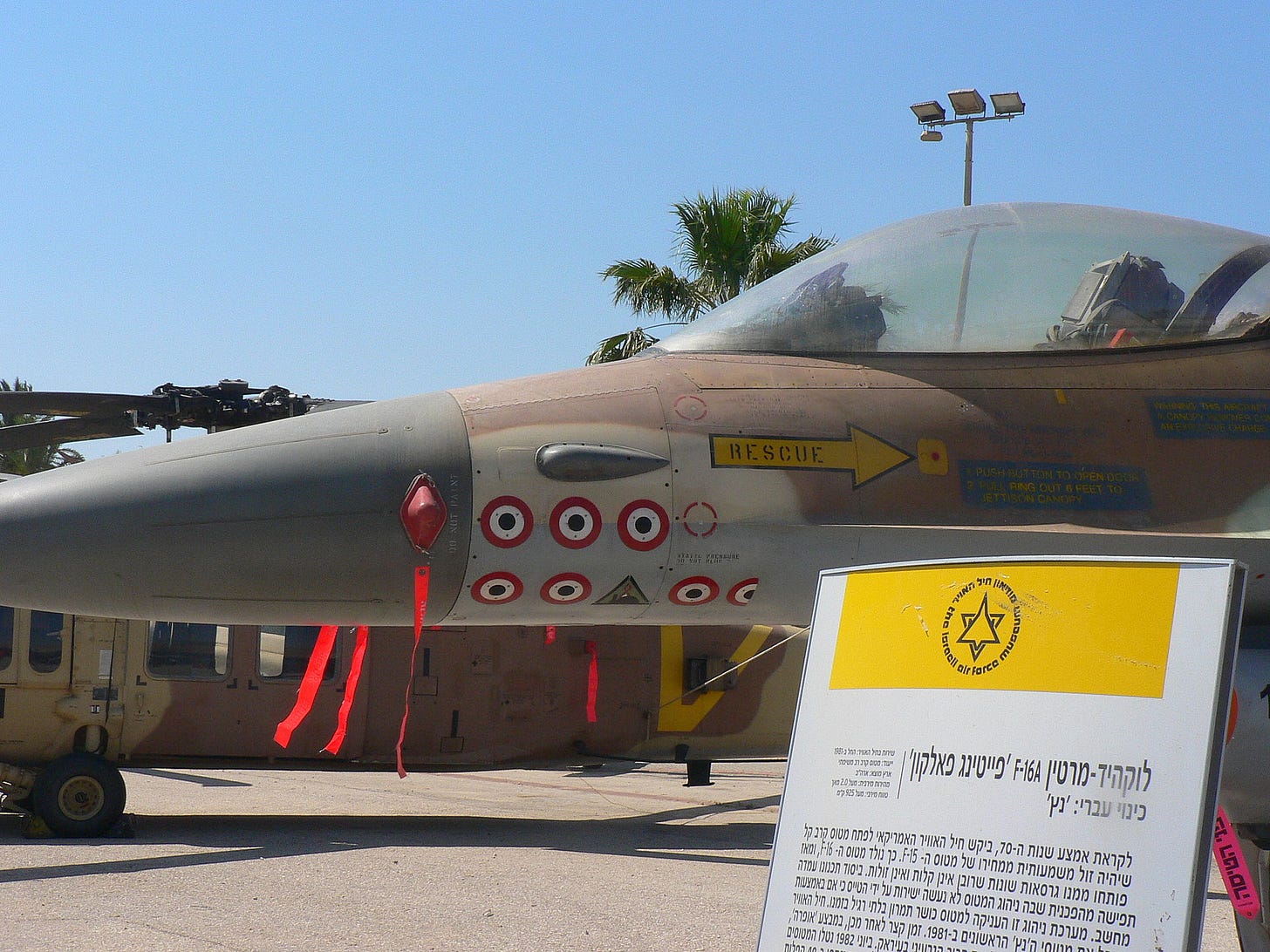When Israel Reminded the World Not to Mess With the Jews
Tuesday's developments — a foiled assassination attempt and hundreds of Hezbollah pagers simultaneously exploding across Lebanon and Syria — are among a long list of remarkable Israeli operations.
Please consider supporting our mission to help everyone better understand and become smarter about the Jewish world. A gift of any amount helps keep our platform free of advertising and accessible to all.
You can also listen to the podcast version of this essay on Apple Podcasts, YouTube Music, YouTube, and Spotify.
Tuesday saw a double-whammy in the making.
First, the Shin Bet (Israel’s security agency) foiled an attempt by Hezbollah to assassinate a former senior Israeli security official using a remotely detonated explosive device.
The Shin Bet said it uncovered a Claymore-style anti-personnel mine, known to be in possession of Hezbollah, which was intended to have been used to target the former official. The bomb had a remote detonation system, including a camera and a cellular connection, which would have allowed Hezbollah to activate it from Lebanon.
Then, also on Tuesday, dozens of Hezbollah operatives were killed and thousands more seriously wounded across Lebanon and even in Syria when the wireless pagers they use to communicate exploded. The Iranian ambassador to Lebanon was reportedly injured in the explosions as well.
A senior Lebanese security source said that Israel infiltrated the communication system of individual devices and detonated them.1 According to reports, phones were called before the explosion for some period of seconds to increase the chance that whoever received the call would pick it up and be maximally wounded. Around 500 members of Hezbollah have lost their eyesight, Saudi TV channel Al-Hadath reported.
Sky News Arabia quoted sources saying that the Mossad (Israel’s intelligence agency) infiltrated supply chains and rigged the pagers with explosives before they were imported to Lebanon some five months ago. Mossad operatives placed a quantity of PETN, a highly explosive material, on the batteries of the devices and detonated them by raising the temperature of the batteries from afar, a source said.2
It was yet another Israeli operation that reminded the world: Don’t f*ck with the Jews.
Here are seven other remarkable operations conducted by Israel:
1) Operation Opera (1981)
In June 1981, Israeli fighter jets flew hundreds of miles across hostile territory to destroy Iraq’s Osirak nuclear reactor near Baghdad. Iraqi President Saddam Hussein had sought to develop nuclear weapons, and the Osirak reactor, though presented as a peaceful project, posed a significant threat to Israel.
Intelligence reports indicated that once operational, the reactor could provide Iraq with weapons-grade plutonium, bringing Iraq closer to a nuclear bomb.
The daring airstrike was carried out by eight F-16 fighter jets, escorted by six F-15s, in a raid that lasted less than two minutes. The mission was successful, and the reactor was destroyed, preventing Iraq from advancing its nuclear ambitions.
The operation demonstrated Israel’s proactive approach to neutralizing existential threats and set a precedent for preemptive strikes in the face of looming dangers.
In a striking parallel to Operation Opera, Israel launched another preemptive airstrike in 2007, this time targeting a secret nuclear reactor in Syria. Known as Operation Orchard, the mission was carried out after Israeli intelligence discovered that Syria, with assistance from North Korea, was building a nuclear reactor at Al-Kibar, which was nearing completion. The reactor posed a significant threat, as it could produce plutonium for nuclear weapons.
On the night of September 6th, 2007, Israeli fighter jets crossed into Syrian airspace and bombed the Al-Kibar facility, destroying it entirely. The Syrian government did not immediately retaliate or publicly acknowledge the incident, which allowed tensions to de-escalate. Operation Orchard was significant for preventing Syria from becoming a nuclear threat, and it demonstrated Israel's ongoing commitment to maintaining its strategic edge in the region.
2) Stuxnet (2010)
Stuxnet represented a new era of warfare — cyber warfare — and marked Israel’s emergence as a formidable player in the cyber domain.
In the late 2000s, as Iran advanced its nuclear program, concerns grew that the country was close to developing a nuclear weapon. Rather than launching a traditional military strike, Israel, in collaboration with the United States, deployed a sophisticated cyber-weapon to sabotage Iran’s nuclear ambitions.
The Stuxnet virus, a highly advanced piece of malware, infiltrated Iran’s Natanz nuclear facility, targeting centrifuges used to enrich uranium. The virus caused the centrifuges to spin out of control, ultimately damaging them and setting back Iran’s nuclear program by several years.
What made Stuxnet unique was its precision — it specifically targeted the control systems of the centrifuges while leaving other systems unaffected. The operation was a masterclass in cyber espionage and marked a significant turning point in modern warfare, where digital tools became just as crucial as conventional weapons.
3) Operation Wrath of God (1972-1988)
Following the brutal massacre of 11 Israeli athletes by the Palestinian group Black September during the 1972 Munich Olympics, Israel launched a covert assassination campaign known as Operation Wrath of God. The mission aimed to eliminate those responsible for planning and carrying out the massacre, as well as key figures in Palestinian militant groups.
Over the course of several years, Mossad agents meticulously tracked down and assassinated numerous operatives and leaders of the Palestinian Liberation Organization (PLO) and Black September, including mastermind Ali Hassan Salameh.
The campaign sent a powerful message that Israel would respond decisively to attacks on its citizens, no matter how long it took or where the perpetrators tried to hide. While the operation was not without controversy, it is viewed as a clear example of Israel’s relentless pursuit of justice and retribution.
4) Hamas leader assassination in Iran (2024)
At 1:14 Israel time — which is 1:44 Tehran time — on July 31st, 2024 the signal was given. A few seconds later, the bomb exploded in Hamas leader Ismail Haniyeh’s room in the official and well-protected residence of Iran’s Islamic Revolutionary Guard Corps.
The compound, called Neshat, is in an affluent north Tehran neighborhood and used for retreats, secret meetings, and “housing prominent guests” such as Haniyeh. His room, which is reserved for important and especially privileged guests, was liked by Haniyeh and was used in all his visits to the country, and also in this one — where he arrived a day earlier for the inauguration ceremony of the new Iranian president the next day.
During the ceremony and after it, on Tuesday until the evening, Haniyeh was photographed hundreds of times. In fact, he was probably one of the most photographed at this event, due to the timing and international coverage of 86 delegations arriving in the hours before his assassination.
The way the bomb was buried, the angle and where Haniyeh was in the room, the event could only end in one way. He had no chance of coming out of the incident just seriously injured.
Middle Eastern officials said the bomb was planted there roughly two months ago, and that the blast’s precision required months of planning, extensive surveillance, and even artificial intelligence. It was detonated remotely by Mossad operatives who were on Iranian soil after receiving intelligence that Haniyeh was indeed in the room.
The precision of the hit was reminiscent of the remote-operated machine gun that a Mossad team used to kill top Iranian nuclear scientist Mohsen Fakhrizadeh in 2020.
5) Israeli spy Eli Cohen (1960s)
Eli Cohen, one of Israel’s most renowned spies, carried out one of the most daring and successful infiltrations in modern intelligence history.
Born as an Egyptian Jew in Alexandria in 1924, Cohen was recruited by the Mossad (Israel’s intelligence agency) in the early 1960s to undertake a high-risk mission: infiltrating the highest levels of Syria’s political and military elite.
Under the alias Kamel Amin Thabet, Cohen posed as a wealthy Syrian businessman returning from Argentina, gradually gaining the trust of influential figures in Syria’s government and military.
Cohen’s infiltration was nothing short of remarkable. Within a few years, he became deeply embedded in the Syrian ruling class, forging close ties with senior military officers and even the Syrian president, Amin al-Hafiz. His access to top-secret discussions and military plans allowed him to pass critical intelligence to Israel.
One of his most significant contributions was providing Israel with detailed information about Syrian military positions on the Golan Heights, a strategically vital area. This intelligence would later prove crucial during the 1967 Six-Day War, when Israel successfully captured this territory, partly due to the information Cohen had gathered.
Cohen’s influence within Syria was so profound that he was even considered for a top government position, but his success ultimately became his undoing. In 1965, Syrian counterintelligence began to suspect a mole within their ranks and, using Soviet equipment, tracked radio transmissions to Cohen’s apartment in Damascus. He was arrested, tortured, and tried as a spy. Despite international pleas for clemency, including from Israel and various global leaders, Cohen was publicly hanged in Damascus on May 18th, 1965.
Eli Cohen’s mission remains a legendary chapter in the history of espionage. His bravery, dedication, and deep undercover work allowed Israel to gain invaluable insights into its most hostile neighbor at the time. Even decades later, Cohen is remembered as a national hero in Israel, symbolizing the risks and sacrifices made to ensure the nation’s survival.
His last words were: “Tell my family I did my duty. Until the end and I remained loyal to my country.”
6) Operation Moses (1984–1985)
Operation Moses was the covert evacuation of Ethiopian Jews (known as the “Beta Israel” community) from Sudan during a civil war that caused a famine in 1984.
In 1981, Mossad agents scouted the Sudanese coastline and found 15 beachside villas that had been abandoned a decade earlier. Nestled on the shorelines of the Red Sea and boasting picturesque coral reefs, the Mossad built a diving resort provided a front for agents to covertly transport Ethiopian Jewish refugees to boats that would carry them to Israel.
The Sudanese International Tourist Corporation actually believed that it was renting the resort out to hotel managers and diving enthusiasts — all of whom were in fact undercover Israeli operatives. Real, unsuspecting tourists mainly from Europe arrived to stay at the resort, attracted by brochures that touted “breathtaking views of the heavens, aflame with millions of stars” and “an abundance of exotic fish” in “exceptionally clear waters.”
Beginning on November 21st, 1984, Operation Moses involved the air transport by Trans European Airways of some 8,000 Ethiopian Jews from Sudan via Brussels to Israel. Over some seven weeks, more than 30 flights brought about 200 Ethiopian Jews at a time to Israel. Official information related to the mission was declassified only in recent years.
7) Operation Plumbat (1968)
Operation Plumbat was a covert mission carried out by Mossad to secure uranium for Israel’s clandestine nuclear weapons program.
In the late 1960s, Israel was working to develop a nuclear deterrent, but acquiring the necessary materials, such as uranium, was difficult due to international restrictions. In response, Mossad devised a plan to secretly acquire uranium from Europe.
The operation involved the hijacking of a German-owned cargo ship, the “Scheersberg A” which was carrying a shipment of uranium ore disguised as “plumbat” (a type of lead). The ship mysteriously disappeared while en route to Italy, and when it resurfaced, the uranium was missing.
The operation provided Israel with the critical materials it needed to advance its nuclear program. The success of Operation Plumbat remains shrouded in secrecy, but it is widely believed to have played a crucial role in Israel’s nuclear capabilities.
“Pager detonations wound thousands, majority Hezbollah members, in suspected cyberattack.” The Jerusalem Post.
“Reports: Mossad rigged pager batteries with explosives, devices were imported 5 months ago.” The Times of Israel.





Add one more ... Entebbe
This pager stuff is so ridiculously bad ass.
I'm Scottish and never use that phrase but it's appropriate here.
Amazing